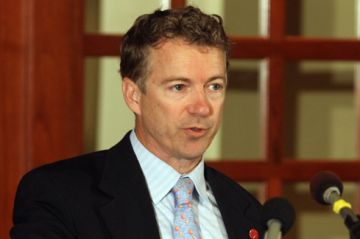Will the Tea Party change anything?

 "I think it's eerily like 1994. Not much will change." That's what Rich Hamblen told me about the 2010 midterm elections on our way to a political conference sponsored by the Los Angeles-based Tenth Amendment Center. And Rich would know. With decades of political activism under his belt, and a year of hard time for civil disobedience pertaining to a Second Amendment issue dear to his heart, the man has some serious street cred when it comes to politics.
"I think it's eerily like 1994. Not much will change." That's what Rich Hamblen told me about the 2010 midterm elections on our way to a political conference sponsored by the Los Angeles-based Tenth Amendment Center. And Rich would know. With decades of political activism under his belt, and a year of hard time for civil disobedience pertaining to a Second Amendment issue dear to his heart, the man has some serious street cred when it comes to politics.
I challenged him, ever the optimist, and admittedly a Tea Party sympathizer:
"But can't you see the difference now? Back then they could promise us hope and change, but give us more of the same. Now we've got the Internet. In 1995 the media could distract us with some celebrity scandal while Congress quietly passed a gargantuan spending bill; now they can't hide it. News of it will spread virally in minutes on Twitter, Facebook, and the blogosphere. These Tea Party people want less government and they mean it. Things might really change in Washington."
Rich flashed me a toothy grin, "I guess you have a point. Maybe things will change."
I've made no secret here of my sympathy for the Tea Party protest movement that started in early 2009, and I've contended that its positions on Federal spending and corporate welfare are not merely right, but obvious, and absolutely necessary to the continued existence and prosperity of this country as it is presently constituted.
Our national debt is insane, suicidal, and simply unsustainable. Borrowing money from China to give to rich Wall Street banks and promising that middle-class and poor Americans will pay for it later is clearly morally repugnant. Not reading a bill before deciding if it should be a law is an obviously absurd dereliction of duty. No wonder America's perpetual outrage at Washington has erupted in the fury of the Tea Party movement. The question is: "Will this time be different?" Will this be different than all the other times a "reforming" group, president, or party swept in and continued with business as usual in Washington DC?
In addition to my observation about the Internet, there are many encouraging signs that maybe, just maybe all the rhetoric about fiscal responsibility and government transparency isn't just a cynical ploy for votes. Of course, there are plenty of politicians and organizations who have jumped on the bandwagon, but that doesn't mean there aren't some sincere leaders, and maybe even politicians who want to turn the Federal government around. Tea Party leaders aren't playing nice at all with the likes of John Boehner and Mitch McConnell.
Tea Party candidate and Senator-elect Rand Paul, Sarah Palin, Michele Bachmann, and grassroots Tea Party leaders have publicly and vocally butted heads with Republican leadership for its recent support of a pork-filled tax compromise that adds to the deficit and a food safety act that consolidates control over the food supply in the hands of federal regulators and giant agro-corporations. Meanwhile, Tea Party activists have managed to stall a trillion dollar omnibus spending bill in the Senate (Pay attention California! That bill would have put you on the hook for cranberry breeding in New Jersey, oyster safety in Florida, peanut research in Alabama, and beaver management in North Carolina).
And in the latest headlines, Dave Weigel has published a memo announcing meetings on Capitol Hill for Congressional staffers on how to insert clauses into legislation naming the part of the Constitution that authorizes Congress to pass that particular bill. As Weigel correctly reminds us, "This was a big Tea Party demand that Republicans ran on, and they're not welching."
While it would be boldly naive to assert that 2011 will see the end of "politics as usual," perhaps it's not too far off the mark to say that 2011 very well might see the beginning of some substantial changes in Washington and an earnest, hard-fought effort by a determined minority of reforming politicians to make those changes. And unlike the mid-nineties, we'll be watching Congress very, very closely.



